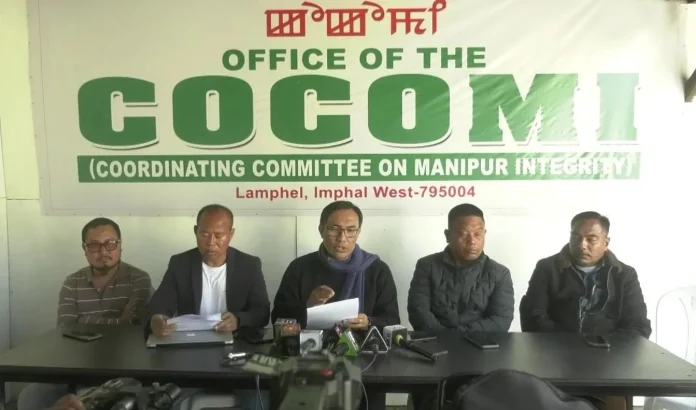SENAPATI, April 5: The Coordinating Committee on Manipur Integrity (COCOMI) has strongly criticized the recent peace talks convened by the Ministry of Home Affairs in Delhi between Meetei and Chin-Kuki-Mizo-Zomi-Hmar community representatives. The organization dismissed the engagement as a “stage-managed exercise” designed to reinforce a “misleading narrative” previously presented by Union Home Minister Amit Shah in Parliament.
In a press release, COCOMI declared its non-participation in what it described as an “orchestrated spectacle,” claiming that the Government of India is deliberately misrepresenting the Manipur crisis as a mere ethnic conflict between the Meetei and Kuki communities. The group asserts that this portrayal overlooks the complex realities of the ongoing unrest, particularly alleging the existence of a state-sponsored proxy war involving Chin-Kuki narco-terrorist networks.
“This so-called peace initiative is nothing more than a carefully timed political performance to serve the Union Home Minister’s narrative in Parliament,” stated the organization in a press release.
COCOMI accused the central government of taking a partisan stance since the outbreak of violence in 2023 and noted that its previous discussions with government officials, including those held in Imphal, made it clear that the people of Manipur no longer view New Delhi as an impartial broker of peace.
The committee also condemned the ongoing Suspension of Operations (SoO) Agreement, in place since 2005, which it claims has allowed foreign-origin armed groups to operate freely in the state’s hill areas. These groups, according to COCOMI, continue to control territory and destabilize governance with impunity due to the inaction of both the state and central authorities.
In its statement, COCOMI issued a series of immediate demands, which it views as essential preconditions for any genuine peace process:
- Strict enforcement of the rule of law across Manipur.
- Neutralization of armed groups, particularly those under SoO, operating in the hill regions.
- Legal prosecution of militants involved in territorial occupation and highway blockades.
- Revocation of the SoO agreement to dismantle militant strongholds.
- Restoration of free movement and unimpeded road access throughout the state.
- Holding accountable those who undermine peace efforts, including defiance of initiatives led by the Union Home Minister and the Governor.
- Acknowledgment of the true causes of the conflict, including illegal immigration, narco-terrorism, and separatist movements.
- Direct engagement by the government with SoO leadership, bypassing civilian proxies.
COCOMI concluded its statement by reiterating that no peace process involving civil society representatives can be meaningful until the Government of India restores a terror-free environment. The group emphasized that civil society lacks the capacity to disarm militants or enforce the rule of law, and that the central government must assume full responsibility for bringing about lasting peace in the region.

